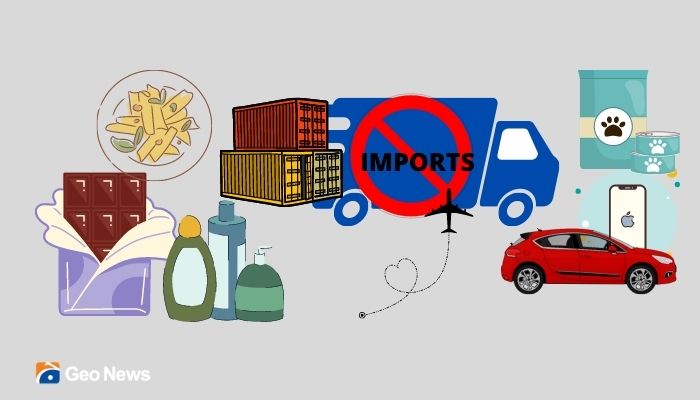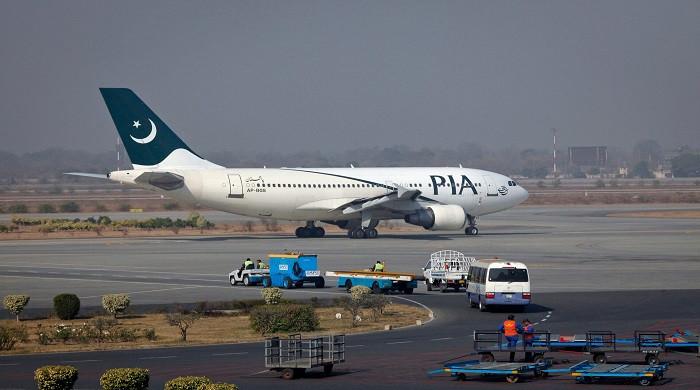Import ban: Is the govt planning to add more items to its list?
FBR will add more products to existing list of banned items in an effort to curb rising imports
June 07, 2022

- Government has been exploring alternatives to further restrict imports.
- FBR will add more products to existing list of banned items in an effort to curb rising imports.
- The government previously banned 38 items.
ISLAMABAD: The government has been exploring alternatives to further restrict imports in the upcoming 2022–23 budget, with plans to ban more luxury products and put more items to the regulatory duty (RD) list under consideration, The News reported Tuesday.
The chairman and members of the Federal Board of Revenue (FBR) were compiling a list of things to add to the existing list of banned items in an effort to curb rising imports. The ban will presumably remain in effect for a few months to meet World Trade Organization conditions (WTO).
"The prime minister has given instructions to the Ministry of Commerce, FBR, and other budget makers to identify items for the purpose of banning and slapping RDs in a bid to decrease import bills. The number of items that will be added to the RD list or banned list has not been decided yet," said a senior official while talking to The News on Monday.
The government previously banned 38 items, but later had to issue a clarification while withdrawing some items from the list. The official sources added that this task requires a lot of spadework because it might create distortions in the economy.
The Ministry of Finance and the Planning Commission were deliberating on curtailing the trade deficit in the coming budget by envisaging fixing an export target of $32 billion with imports in the range of $65 billion. Imports in the outgoing fiscal year have been estimated to stand at $71 billion.
"We are trying to curtail imports by $6 billion in the coming budget, so we are planning to bring imports down to $65 billion from $71 billion," an official with insight told The News. Budget makers expect to save $3 billion on imports of COVID-19 vaccines in the coming fiscal, with additional savings of $2 billion on account of reduced shipping costs and rents.
"The government is considering measures to curtail imports by $1 billion through different tariff and non-tariff barriers," the official said. However, the World Bank projects that energy and commodity pricing in the international market is another risk for import-dependent countries as average oil prices and food commodities might continue on the higher side in the first six months of the current fiscal year.
The government conducted a study in the recent past to consider different measures for curtailing import bills in the wake of the ban when it was found that import elasticity would not allow any major reduction with the imposition of taxation measures. Following the findings of the study, the government finally slapped a ban on the import of luxury and non-essential items.
It was being deliberated that the imposition of an import ban was a short-term phenomenon because it requires approval of the WTO as under Article XII it states, notwithstanding the provision of paragraph 1 of Article XI any contracting party in order to safeguard its external financial position and its balance of payment, could restrict the quantity or value of merchandise permitted to be imported.
Currently, around 600 items are listed in the FBR issued SROs, imposing regulatory duty in the range of 5 to 10 percent on June 30, 2021, but there are certain items where the RD is imposed in the range of 30 to 50 percent.
Regulatory duty on potatoes and citrus fruits either fresh or dried was 25 percent; on papayas it was 45 percent, apricots, cherries, peaches (including nectarines), plums and sloes, fresh 35 percent; sour cherries, peaches, including nectarines 45 percent; sauces and preparations, mixed condiments and mixed seasoning, mustard flour and meal and prepared mustard 50 percent and dog or cat food, put up for retail sale at rate of 50 percent etc. In another SRO, the FBR also slapped regulatory duty on another 700 items. So currently, the FBR is imposing regulatory duty on around 1,200 to 1,300 items.











